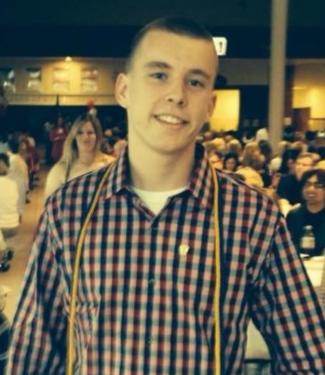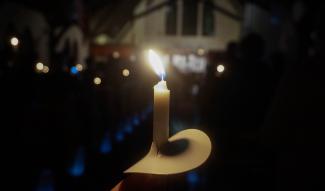In April 2016, a 20-year-old parishioner of Trinity Church in Bridgewater, Emmett Scannell, died due to a heroin overdose. Such tragedies have become a national epidemic and are becoming more and more common here in Massachusetts. According to the National Institute on Drug Abuse, Massachusetts is among the top 10 states with the highest rates of opioid-related overdose deaths, with an opioid-related death rate at now more than twice the national average. In 2016, the rate of opioid-related deaths in Massachusetts was 29.7 deaths per 100,000 persons, compared to the national rate of 13.3 deaths per 100,000 persons.
Emmett’s mother, Aimee D’Arpino, also a member of Trinity Church in Bridgewater, explained in an interview that while her son was away at college on an academic scholarship, struggling with his addiction, she was worried about what people would say about her son’s battle with substance-use disorder.
“When he was really in the height of his addiction I stopped going to church,” D’Arpino said. “We’re a very small community and everybody knows everybody and cares about everybody.”
Even with the knowledge that her church community cared about her family, D’Arpino still feared the social stigma that surrounds substance-use disorder.
“Substance-use disorder is very much looked at as a moral failing and a choice,” D’Arpino said. “Of course the choice is to use the substance for the first time, but so many people are affected by this disease where, once they’ve started using that substance, it is no longer a choice, and a lot of people don’t understand that.”
D’Arpino didn’t discover the supportive community that she had in her church until Emmett’s wake, when almost every member of her church showed up to support her family.
“The stigma that I was anticipating I was placing on myself,” D’Arpino said. “As I shared with them why I hadn’t been coming, the church’s immediate response, in addition to wanting to support the family, was that they wanted to make sure that no one else felt like this wasn’t a safe place, whether you’re dealing with addiction yourself, or you have a loved one who is dealing with addiction.”
From this community’s loss, the “Friends of Emmett” addiction ministry at Trinity Church in Bridgewater was created, named after D’Arpino’s son.
The Rev. Natasha Stewart, who recently began serving as the priest-in-charge at St. Luke’s Church in Scituate, was the rector of Trinity Church in Bridgewater for the past 10 and one-half years. When the congregation came to her asking about a way to support Emmett’s family, she did some research and discovered an addiction ministry at First Baptist Church in Plaistow, N.H., called “Mercy Street: A collection of souls affected by addiction.” Stewart and others from “Friends of Emmett” were invited to attend the service and received both the pastor’s blessing as well as encouragement to use the name “Mercy Street” and create similar “Mercy Street” services wherever they saw fit.
The monthly Mercy Street service at Trinity Church in Bridgewater involves a meal where everyone can gather together for food and fellowship. Following the meal, the children go off and have a separate program with a trained art therapist while the adults gather for a healing service and an educational opportunity or offering of a personal testimony, alternating each month.
“We try to keep it a little bit ecumenical so that everybody feels welcome,” D’Arpino said. “It’s not an Episcopal event so to speak, even though it happens within our church. We want to make sure that everyone feels comfortable coming and participating where they’re comfortable,” D’Arpino said.
In addition to these monthly Mercy Street services, those involved in the “Friends of Emmett” ministry volunteer at drop-in centers and recovery events to help end the stigma associated with substance-abuse disorder, as well as provide outreach to those in need, such as those who are homeless in the local area. D’Arpino said that the mission of the “Friends of Emmett” ministry is simply to make people feel loved and welcome.
“Everyone wants to feel loved and supported and deserves to feel loved and supported, regardless of where they are or what their circumstances are. That’s basically what our mission is all the time,” D’Arpino said.
D’Arpino now works as the director of community engagement for the Addiction Policy Forum based in Washington, D.C., and was able to secure a materials grant for 300 kits of the opioid overdose reversal medication Naloxone, enough for every congregation and worshiping community in the diocese to have at least one.
The Rev. Natasha Stewart has also gotten involved with the Addiction Policy Forum, volunteering to be the state chair for Massachusetts. From all of this work and ministry, Stewart decided to author a resolution on this topic, which was approved at Diocesan Convention this past November.
The resolution encourages the church to respond to the opioid crisis by recognizing addiction as a disease and partnering "with those who are already doing the work of healing and support to the people affected by this epidemic to learn best practices of how to reach out and provide God’s loving mercy to those who are struggling with addiction and to the family and friends who support them in their work of recovery."
In addition, the resolution encourages churches to have Naloxone available and that clergy and other parish leaders be trained to administer it.
Stewart explained in an interview that she was worried about pushback when it came to voting at the convention, but when there was no discussion and convention-goers cheered over the fact that the kits would be provided to each church for free, her fears were alleviated.
“To me that speaks loudly to the need for this,” Stewart said, “that this is a real need in our society and particularly a real need for us as a church to be responding to.”
A group is forming to determine the best ways to implement the Diocesan Convention resolution. Diocesan Missioner for Networking and Formation Martha Gardner hopes that churches that are already doing some form of addiction ministry can come together and form a network to compile some best practices to offer to congregations through an educational program, along with the Naloxone kits and training.
“What I hope comes out of this is that a real network develops of people who care about this issue and want to support one another in whatever they are trying,” Gardner said.
Gardner said that the goal is that in 2019 every congregation in the diocese will have received Naloxone kits and the training to administer the medication, as the resolution encourages, as well as an opportunity for educational discussion on where people are in their own ministries and their own lives.
“If there’s any place where people can grieve and talk about it, it would be congregations where you find that safe, sacred place where you can have that support and conversation,” Gardner said.
In her work, Emmett’s mother, Aimee D’Arpino, has often heard people say that, while this ministry seems like a great idea, they don’t have an opioid problem in their town, in their church or in their family. D’Arpino said that she believes those are the most dangerous words someone could ever say because the disease doesn’t discriminate.
“I think if we’re discussing it as a church, our families will feel comfortable coming in and seeking the support that they really need, because they’re not getting it anywhere else,” D’Arpino said. “I think it helps take the blinders off a little bit for families when they realize that not only is it something that can happen in their church, it is something that can happen in their home, and that if it does, it’s nothing to be embarrassed or ashamed about.”
In 2017, the Addiction Policy Forum Families Committee announced a National Day of Remembrance and held events in participating communities throughout the country. Trinity Church in Bridgewater each year hosts an ecumenical healing service on this day for those affected by the disease of addiction, and this year, is teaming up with local mental health agencies, addiction specialists and a pastoral support team to offer a special program of conversation and reflection for young people and youth workers from across the diocese, to be held just before the service of remembrance.
The event will take place on Sunday, Jan. 27. At 3 p.m. middle and high school students, along with their mentors, are invited to explore the impact of drug addiction, their own or others’, on their lives and their communities. Then at 5 p.m., the ecumenical healing service and candlelight vigil for those affected by the disease of addiction will take place, followed by a buffett dinner at 6 p.m.
For more information about the youth program on Jan. 27, contact diocesan Youth Missioner the Rev. H. Mark Smith at hmsmith@diomass.org.
Congregations that are already doing some form of addiction ministry or that are interested in learning more about forming a network are invited to contact the diocesan Missioner for Networking and Formation Martha Gardner at mgardner@diomass.org.
Those interested in attending a Mercy Street service at Trinity Church in Bridgewater, or who would like to learn more about the “Friends of Emmett” ministry there, are invited to contact Aimee D’Arpino at adarpino@addictionpolicy.org.
--Bridget K. Wood



